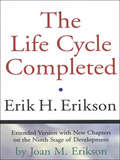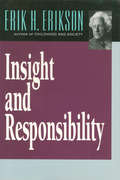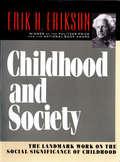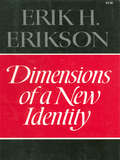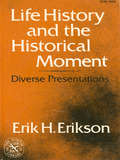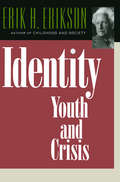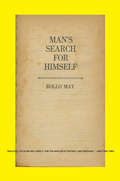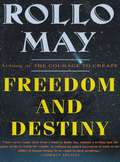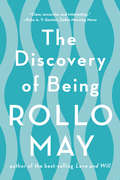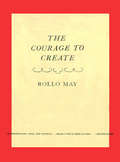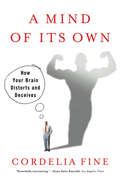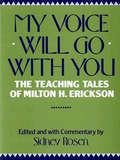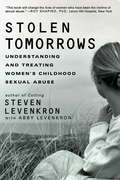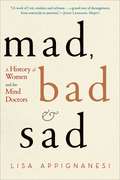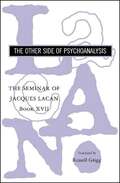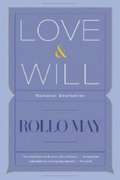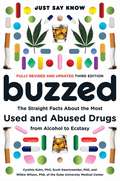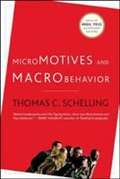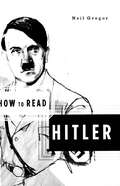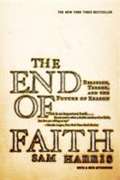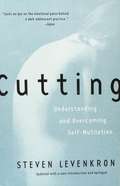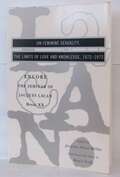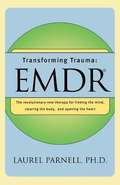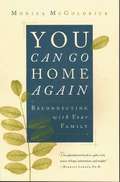- Table View
- List View
The Life Cycle Completed (Extended Version)
by Erik H. Erikson Joan M. Erikson"This book will last and last, because it contains the wisdom of two wonderfully knowing observers of our human destiny."--Robert Coles For decades Erik H. Erikson's concept of the stages of human development has deeply influenced the field of contemporary psychology. Here, with new material by Joan M. Erikson, is an expanded edition of his final work. The Life Cycle Completed eloquently closes the circle of Erikson's theories, outlining the unique rewards and challenges--for both individuals and society--of very old age.
Insight and Responsibility
by Erik H. Erikson<P> In the six essays contained in this text the author reflects on the ethical implications of psychoanalytical insight. <P> Among the topics covered are: Freud's discovery that the human mind can only be studied through a partnership between observer and observed; how clinical evidence is made up of a unique mixture of subjective and objective; an observation on the way issues of identity affect not only individuals but classes of people; and an examination of the links between ego formation and institutions and traditions. Erikson also discusses the origins of ethics and looks at psychiatry as the pragmatic Western version of the universal journey to self-awareness.
Childhood and Society
by Erik H. EriksonThe landmark work on the social significance of childhood. The original and vastly influential ideas of Erik H. Erikson underlie much of our understanding of human development. His insights into the interdependence of the individuals' growth and historical change, his now-famous concepts of identity, growth, and the life cycle, have changed the way we perceive ourselves and society. Widely read and cited, his works have won numerous awards including the Pulitzer Prize and the National Book Award. Combining the insights of clinical psychoanalysis with a new approach to cultural anthropology, Childhood and Society deals with the relationships between childhood training and cultural accomplishment, analyzing the infantile and the mature, the modern and the archaic elements in human motivation. It was hailed upon its first publication as "a rare and living combination of European and American thought in the human sciences" (Margaret Mead, The American Scholar). Translated into numerous foreign languages, it has gone on to become a classic in the study of the social significance of childhood.
Dimensions of a New Identity
by Erik H. EriksonThe two lectures presented in this important volume were delivered by Erik H. Erikson at the second annual Jefferson Lectures in the Humanities, sponsored by The National Endowment for the Humanitites. In the first lecture, entitled "The Founders: Jeffersonion Action and Faith," Erikson uses selected themes from Jefferson's life to illustrate some principles of psychohistory. In the second lecture, "The Inheritors: Modern Insight and Foresight," Erikson applied his main concepts to the problems of ongoing history. The title of the lectures contains one such concept. "New identity" is the result of radical historical change and is here meant to characterize the emerging American identity as first embodied in such men as Jefferson. Erikson first explores certain themes in his examination of the emerging American identity during Jefferson's time. He then attempts to relate the Jeffersonian themes to contemporary problems of repression and suppression, of moralistic vindication, and true liberation by insight. Finally, Erikson maintains that now that children will be born by the privileged choice of parental persons, an adult environment fitting the living and the to-be-living becomes an ethical necessity. There is no question that this work ranks among Erikson's most challenging and seminal books.
Life History and the Historical Moment: Diverse Presentations
by Erik H. Erikson<P> One of the most powerful (though deceptively simple) of current ideas is Erik H. Erikson's insight into the nature of the interrelationships of the psychogenic development of an individual and the historical development of the times. <P> This insight, present in all his work beginning with Childhood and Society, and particularly examined in Young Man Luther and Gandhi's Truth, finds full and mature expression in the present book. <P> Just as Erikson's notion of the identity crisis has been obscured and confused as it has passed into everyday speech, so too have glib popularizers misused his notions of psychobiography and psychohistory. Thus, this book is of supreme importance, not merely to set the record straight, but more especially to make these vital ideas, central to our time, fully available. <P> Consequently, this book opens with autobiography; ranges through discussions of Freud and Gandhi and of the meaning of ideas on womanhood; and concludes with an examination of the role of psychoanalysis in the evolution of ethics.
Identity: Youth and Crisis
by Erik H. EriksonIdentity: Youth and Crisis collects Erik H. Erikson's major essays on topics originating in the concept of the adolescent identity crisis. Identity, Erikson writes, is an unfathomable as it is all-pervasive. It deals with a process that is located both in the core of the individual and in the core of the communal culture. As the culture changes, new kinds of identity questions arise--Erikson comments, for example, on issues of social protest and changing gender roles that were particular to the 1960s. Representing two decades of groundbreaking work, the essays are not so much a systematic formulation of theory as an evolving report that is both clinical and theoretical. The subjects range from "creative confusion" in two famous lives--the dramatist George Bernard Shaw and the philosopher William James--to the connection between individual struggles and social order. "Race and the Wider Identity" and the controversial "Womanhood and the Inner Space" are included in the collection.
Man's Search for Himself
by Rollo May"Analyzes life as we are living it, and the analysis is truthful and profound."--New York Times Loneliness, boredom, emptiness: These are the complaints that Rollo May encountered over and over from his patients. In response, he probes the hidden layers of personality to reveal the core of man's integration--a basic and inborn sense of value. Man's Search for Himself is an illuminating view of our predicament in an age of overwhelming anxieties and gives guidance on how to choose, judge, and act during such times.
Freedom and Destiny
by Rollo May"May is an existential analyst who deservedly enjoys a reputation among both general and critical readers as an accessible and insightful social and psychological theorist. ... Freedom's characteristics, fruits, and problems; destiny's reality; death; and therapy's place in the confrontation between freedom and destiny are examined. ... Poets, social critics, artists, and other thinkers are invoked appropriately to support May's theory of freedom and destiny's interdependence."-Library Journal. "Especially instructive, even stunning, is Dr. May's willingness to respect mystery. ... There is, too, at work throughout the book a disciplined yet relaxed clinical mind, inclined to celebrate ... what Flannery O'Connor called 'mystery and manners,' and to do so in a tactful, meditative manner. "-Robert Coles, America.
Freedom and Destiny
by Rollo MayThe popular psychoanalyst examines the continuing tension in our lives between the possibilities that freedom offers and the various limitations imposed upon us by our particular fate or destiny. "May is an existential analyst who deservedly enjoys a reputation among both general and critical readers as an accessible and insightful social and psychological theorist. . . . Freedom's characteristics, fruits, and problems; destiny's reality; death; and therapy's place in the confrontation between freedom and destiny are examined. . . . Poets, social critics, artists, and other thinkers are invoked appropriately to support May's theory of freedom and destiny's interdependence."--Library Journal "Especially instructive, even stunning, is Dr. May's willingness to respect mystery. . . .There is, too, at work throughout the book a disciplined yet relaxed clinical mind, inclined to celebrate . . . what Flannery O'Connor called 'mystery and manners,' and to do so in a tactful, meditative manner."--Robert Coles, America
The Discovery of Being: Writings in Existential Psychology
by Rollo May"Clear, accurate, and interesting. There is no better short introduction to the existential approach to psychology." --Dallas Morning News The brilliant psychologist Rollo May was a major force in existential psychology. Here, he brings together the ideas of Kierkegaard, Nietzsche, and other great thinkers to offer insights into its ideas and techniques. He pays particular attention to the causes of loneliness and isolation and to our search to find new and firm moorings in order to move toward a future where responsibility, creativity, and love can play a role.
The Courage to Create
by Rollo May"Extraordinary, wise, and hopeful... nearly poetic meditations."--Boston Globe What if imagination and art are not, as many of us might think, the frosting on life but the fountainhead of human experience? What if our logic and science derive from art forms, rather than the other way around? In this trenchant volume, Rollo May helps all of us find those creative impulses that, once liberated, offer new possibilities for achievement. A renowned therapist and inspiring guide, Dr. May draws on his experience to show how we can break out of old patterns in our lives. His insightful book offers us a way through our fears into a fully realized self.
A Mind of Its Own: How Your Brain Distorts and Deceives
by Cordelia Fine"Provocative enough to make you start questioning your each and every action."--Entertainment Weekly The brain's power is confirmed and touted every day in new studies and research. And yet we tend to take our brains for granted, without suspecting that those masses of hard-working neurons might not always be working for us. Cordelia Fine introduces us to a brain we might not want to meet, a brain with a mind of its own. She illustrates the brain's tendency toward self-delusion as she explores how the mind defends and glorifies the ego by twisting and warping our perceptions. Our brains employ a slew of inborn mind-bugs and prejudices, from hindsight bias to unrealistic optimism, from moral excuse-making to wishful thinking--all designed to prevent us from seeing the truth about the world and the people around us, and about ourselves.
My Voice Will Go with You: The Teaching Tales of Milton H. Erickson
by Sidney Rosen"A chalice of wisdom for our time."--Ernest L. Rossi, Ph.D., C.J. Jung Institute of Los Angeles Milton H. Erickson has been called the most influential hypnotherapist of our time. Part of his therapy was his use of teaching tales, which through shock, surprise, or confusion--with genius use of questions, puns, and playful humor--helped people to see their situations in a new way. In this book Sidney Rosen has collected over one hundred of the tales. Presented verbatim and accompanied by Dr. Rosen's commentary, they are grouped under such headings as Motivating Tales, Reframing, and Capturing the Innocent Eye.
Stolen Tomorrows: Understanding and Treating Women's Childhood Sexual Abuse
by Steven Levenkron Abby Levenkron"The most practical, down to earth, thoughtful, and sensitive book written on women's childhood sexual abuse."--Samuel C. Klagsbrun, MD From the psychotherapist who offered groundbreaking work on self-mutilation (Cutting) comes a landmark examination of the psychology of sexual abuse. Stolen Tomorrows encourages the 20 percent of women who have been abused to think about, talk about, and seek help for what has been their secret shame. In addition to giving therapists and other helpers an empathic insight, Stolen Tomorrows will enable the survivor to recognize herself in both her personal history and her current struggle to overcome the legacy of abuse.
Mad, Bad and Sad: A History of Women and the Mind Doctors
by Lisa AppignanesiThis fascinating history of mind doctors and their patients probes the ways in which madness, badness, and sadness have been understood over the last two centuries. Lisa Appignanesi charts a story from the days when the mad were considered possessed to our own century when the official psychiatric manual lists some 350 mental disorders. Women play a key role here, both as patients "among them Virginia Woolf, Sylvia Plath, and Marilyn Monroe" and as therapists. Controversially, Appignanesi argues that women have significantly changed the nature of mind-doctoring, but in the process they have also inadvertently highlighted new patterns of illness.
The Seminar of Jacques Lacan: The Other Side of Psychoanalysis (Book XVII)
by Jacques LacanRevolutionary and innovative, Lacan's work lies at the epicenter of modern thought about otherness, subjectivity, sexual difference, and enjoyment. This new translation of Jacques Lacan's deliberation on psychoanalysis and contemporary social order offers welcome, readable access to the brilliant author's seminal thinking on Freud, Marx, and Hegel; patterns of social and sexual behavior; and the nature and function of science and knowledge in the contemporary world.
Love and Will
by Rollo MayAccording to Rollo May, the heart of man's dilemma is the failure to understand the real meaning of love and will, their source and interrelation. Bringing fresh insight to these concepts, May shows, in this book, how we can attain a deeper consciousness.
Buzzed: The Straight Facts About The Most Used And Abused Drugs From Alcohol To Ecstasy
by Cynthia Kuhn Scott Swartzwelder Wilkie WilsonThe third edition of the essential, accessible source for understanding how drugs work and their effects on body and behavior. Together, the first two editions of Buzzed have sold over 120,000 copies-and now the authors have revised and updated the book to include the most recent discoveries about drugs, including new information on the energy drinks craze, prescription drugs such as OxyContin and Ambien, and the date-rape drug GHB. Scientifically accurate and easy to read, this no-nonsense handbook gives the most balanced, objective information available on the most often used and abused drugs, from alcohol, caffeine, and nicotine to heroin, Ecstasy, and methamphetamine. In both quick-reference summaries and in-depth analysis, it reports on how these drugs enter the body, how they manipulate the brain, their short-term and long-term effects, the kinds of "high" they produce, and the circumstances in which they can be deadly. Neither a "Just Say No" treatise nor a "How to" manual, Buzzed is based on the conviction that people make better decisions with accurate information at hand.
Micromotives and Macrobehavior (Updated Edition)
by Thomas C. SchellingMicromotives and Macrobehavior was originally published over twenty-five years ago, yet the stories it tells feel just as fresh today. And the subject of these stories -- how small and seemingly meaningless decisions and actions by individuals often lead to significant unintended consequences for a large group -- is more important than ever. In one famous example, Thomas C. Schelling shows that a slight-but-not-malicious preference to have neighbors of the same race eventually leads to completely segregated populations. The updated edition of this landmark book contains a new preface and the author's Nobel Prize acceptance speech.
How to Read Hitler
by Neil GregorIntent upon letting the reader discover the central concepts of important thinkers, the How to Read series provides a context and an explanation that will facilitate and enrich your understanding of texts vital to our world today. Approaching the writing of major intellectuals, artists, and philosophers need no longer be daunting. How to Read is a new sort of introduction--a personal master class in reading--that brings you face to face with the work of some of the most influential and challenging writers in history. In lucid, accessible language, these books explain essential topics such as the implicit and explicit genocidal message within Hitler's writing.
The End of Faith: Religion, Terror and the Future of Reason
by Sam HarrisAn analysis of the clash between reason and religion in the modern world, calling for a foundation for ethics and spirituality that is secular and humanistic.
Cutting: Understanding and Overcoming Self-Mutilation
by Steven LevenkronLevenkron traces the components that predispose people to self-mutilation: genetics, family experience, childhood trauma, and parental behavior. Also describes how they can be helped.
The Seminar of Jacques Lacan: On Feminine Sexuality, the Limits of Love and Knowledge (Book XX)
by Jacques LacanA startling psycholinguistic exploration of the boundaries of love and knowledge. Often controversial, always inspired, Jacques Lacan here weighs theories of the relationship between the desire for love and the attainment of knowledge from such thinkers as Aristotle, Marx, and Freud. He leads us through mathematics, philosophy, religion, and, naturally, psychoanalysis into an entirely new way of interpreting the two most fundamental human drives. Long anticipated by English-speaking readers, this annotated translation presents Lacan's most sophisticated work on love and desire.
Transforming Trauma: EMDR
by Laurel ParnellEye movement desensitization and reprocessing (EMDR#65533;) has helped thousands of clients haunted by abuse histories or recent traumatic events. It also benefits patients who have not found relief with other therapies and those with chronic conditions or blocked personal and professional performance. EMDR#65533; therapy incorporates eye movements into a comprehensive approach that processes and releases information trapped in the body-mind, freeing people from disturbing images and body sensations, debilitating emotions, and restrictive beliefs. Not only does healing occur much more rapidly than in traditional therapy, but clients also experience a sense of joy, openness, and deep connection with others. EMDR#65533; seems to be a quantum leap in the human ability to heal trauma and maladaptive beliefs.
You Can Go Home Again: Reconnecting with Your Family
by Monica McGoldrick<p>Those who learn from the past are not condemned to repeat it. In this revelatory book, family therapist Monica McGoldrick explains how the use of genograms (family trees) can bring to light a family's history of estrangement, alliance, divorce, or suicide, revealing intergenerational patterns that prove more than coincidental. <p>McGoldrick's genograms of famous families, such as the Kennedys, Hepburns, Beethovens, and Brontës, complement discussion of the influence of birth order and sibling rivalry, family myths and secrets, cultural differences, couple relationships, and the pivotal role of loss. At the close of each chapter are questions that train the reader to think as researcher; with McGoldrick's guidance, we learn to mine previously untapped information about our own family patterns.</p>
